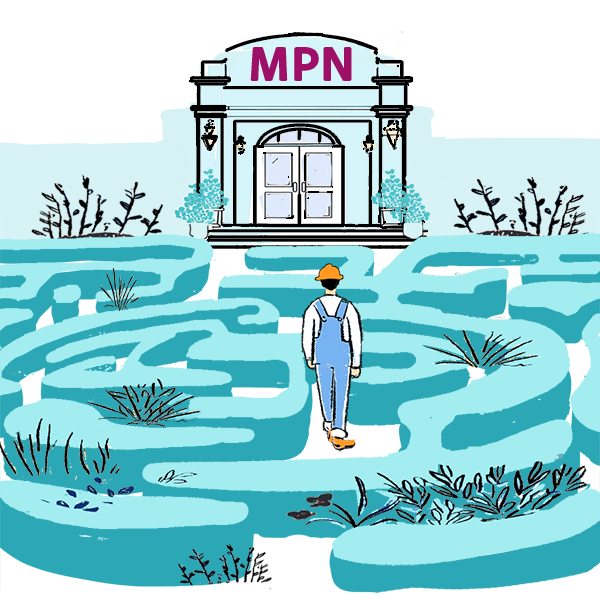ALERT: Disastrous MPN Bill May Be Revived

California State Assembly Bill 1278, which would grant network entities unprecedented control over Medical Provider Networks (MPNs), is on the shelf for now — but the fight for injured workers’ right to choose their physicians is far from over.
AB 1278 was “Referred to suspense file” on May 18, 2023, and remains “In committee: held under submission.” Normally, this would mean the bill is dying slowly in legislative limbo, which would be a significant win for all injured workers.
Unfortunately, injured workers (and their physicians) can’t celebrate just yet.
daisyBill sources report the network entities that sponsored AB 1278 are pledging to find “other bills to use” to secure the right to coordinate physician care within MPNs. In other words, these network entities are apparently not giving up and are attempting to resuscitate AB 1278.
If AB 1278’s sponsors (network entities including Coventry, MedRisk, Conduent, and others) succeed in planting the bill’s language into other legislation, all injured workers in California are in jeopardy of losing their right to choose their physician, not just injured workers covered by MPNs.
Since California does not maintain a functioning employer MPN database, it’s anyone’s guess as to which employers utilize approved MPNs. The failure to offer a way to verify whether an employer’s MPN restricts a given injured worker’s choice of providers means this legislature — if allowed to revive the aims of AB 1278 — would strangle physician choice for potentially every injured worker in the state.
MPN Chaos
A simple MPN database would empower doctors to verify whether an employer has a legitimate, approved MPN per California Labor Code Section 4616 — however, there is no legislation mandating an MPN database. Essentially, California allows employers to restrict their employees’ access to care, but California fails to identify the employers that impose those restrictions.
As we’ve seen repeatedly, a claims administrator such as an insurer or Third-Party Administrator (TPA) can simply assign any approved (or terminated, suspended or revoked) MPN to an injured worker — and there is no reliable way for the worker, their applicant attorney, the physician, specialists, or ancillary service providers to verify the MPN’s legitimacy, or whether the mandated access standards are met.
By failing to give providers a way to confirm whether an MPN is applicable and determine their eligibility to treat, California has effectively adopted a policy of “just trust the claims administrator,” a nudge-nudge-wink-wink MPN system that never questions the sometimes illegitimate assignment of MPNs to claims.
Without an MPN database, every single injured worker is in danger of being ensnared by the next version of AB 1278, because there is no way to verify an MPN/employer relationship or contest the legitimacy of an MPN.
If some version of AB 1278’s language passes into law, there will be nothing to stop network entities from “coordinating care” for all injured workers, according to the networks’ whims and their ability to pressure doctors into lowball discount reimbursement contracts (under threat of exclusion from MPNs).
It won’t matter if an actual, legitimate, approved MPN applies to a given injured worker or not (and so, so often, no MPN actually applies). It will only matter that the networks say an MPN (any MPN) applies, accurately or otherwise.
Assembly Bill 1278: Network Control of MPNs
As we explain in detail here, AB 1278 would have allowed MPNs to list network entities like Coventry, MedRisk, Conduent, and others — all principal sponsors of the bill — instead of individual physicians.
If AB 1278 passed, this would have meant that instead of choosing a physician from within an employer or insurer’s MPN, injured workers would be at the mercy of network entities, who would assume the role of “coordinating care” (i.e. scheduling appointments) with the networks’ preferred physicians.
With the networks in charge of coordinating care, any physician who refuses to accept the networks’ increasingly paltry reimbursement rates would presumably be squeezed out of eligibility to treat injured workers.
As California physical therapists learned the hard way when ancillary services came under network control, the claims administrator reimburses the network rather than the provider; the network subsequently reimburses the provider a fraction of Official Medical Fee Schedule (OMFS) rates — making it increasingly unaffordable to treat injured workers.
Network MPN Takeover “Held Under Submission”
daisyBill received a message from a California law firm thanking daisyNews for educating the public about AB 1278, and informing us the legislation was “pulled” last week.
Sure enough, the California legislature’s legislative information website notes that AB 1278 was “Referred to suspense file” on May 18, 2023, and remains “In committee: held under submission.”
Referring a bill to the suspense file is theoretically a way to pause the bill’s progress towards passage into law, and allow time for thorough modification or reconsideration. However, bills reportedly often fail to make it out of the suspense file; such a referral is therefore understood as a way to kill legislation before it can reach the floor for a full vote.
The California Legislature’s Glossary of Terms defines ‘Held Under Submission’ as:
An action taken by a committee when a bill is heard in committee and there is an indication that the author and the committee members want to work on or discuss the bill further, but there is no motion for the bill to progress out of committee. This does not preclude the bill from being set for another hearing.
Bottom line: there remains a strong chance this bill or its insidious aims could rise from the legislative grave.
Network forces whose business models depend on positioning themselves as middlepeople between carriers and physicians aren’t giving up this fight anytime soon; neither should California physicians and injured worker advocates.
If MPN legislation ultimately passes, it should include a mandate for the DWC to establish a functioning employer MPN database for providers to confirm the employer’s MPN and determine eligibility to treat an injured worker. That, not further obfuscation of the MPN system or a handout to network entities, will best ensure injured workers’ access to timely, quality care.
Harness the power of daisyBill software, data, and expertise for faster, better workers’ comp billing. Request a demo below.
REQUEST DEMO
DaisyBill provides content as an insightful service to its readers and clients. It does not offer legal advice and cannot guarantee the accuracy or suitability of its content for a particular purpose.

.png)

.gif)